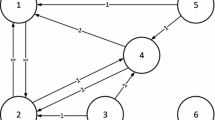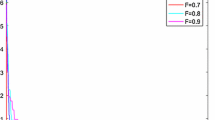Abstract
Differential evolution (DE) is a simple but powerful evolutionary algorithm, which has been widely and successfully used in various areas for solving complex optimization problems. In this chapter, an event-triggered impulsive control scheme (ETI) is introduced to improve the performance of DE. Impulsive control, the concept of which derives from control theory, aims at regulating the states of a network by instantly adjusting the states of a fraction of nodes at certain instants, and these instants are determined by event-triggered mechanism (ETM). After impulsive control and ETM are incorporated into DE, the search performance of the population is altered in a positive way after revising the positions of some individuals at certain moments. At the end of each generation, the impulsive control operation is triggered when the update rate of the population declines or equals to zero. In detail, inspired by the concepts of impulsive control, two types of impulses are presented within the framework of DE in this chapter: stabilizing impulses and destabilizing impulses. Stabilizing impulses help the individuals with lower rankings instantly move to a desired state determined by the individuals with better fitness values. Destabilizing impulses randomly alter the positions of inferior individuals within the range of the current population. By means of intelligently modifying the positions of a part of individuals with these two kinds of impulses, both exploitation and exploration abilities of the whole population can be meliorated.
Access this chapter
Tax calculation will be finalised at checkout
Purchases are for personal use only
Similar content being viewed by others
References
J. Brest, S. Greiner, B. Boskovic, M. Mernik, V. Zumer, Selfadapting control parameters in differential evolution: a comparative study on numerical benchmark problems. IEEE Trans. Evol. Comput. 10(6), 646–657 (2006)
Y. Cai, J. Wang, Differential evolution with neighborhood and direction information for numerical optimization. IEEE Tran. Cybern. 43(6), 2202–2215 (2013)
S. Das, P.N. Suganthan, Differential evolution: a survey of the state-of-the-art. IEEE Trans. Evol. Comput. 15(1), 4–31 (2011)
S. Das, A. Abraham, A. Konar, Automatic clustering using an improved differential evolution algorithm. IEEE Trans. Syst. Man. Cybern. A: Syst. Hum. 38(1), 218–237 (2008)
S. Das, A. Abraham, U.K. Chakraborty, A. Konar, Differential evolution using a neighborhood-based mutation operator. IEEE Trans. Evol. Comput. 13(3), 526–553 (2009)
B. Dorronsoro, P. Bouvry, Improving classical and decentralized differential evolution with new mutation operator and population topologies. IEEE Trans. Evol. Comput. 15(1), 67–98 (2011)
M.G. Epitropakis, D.K. Tasoulis, N.G. Pavlidis, V.P. Plagianakos, M.N. Vrahatis, Enhancing differential evolution utilizing proximity-based mutation operators. IEEE Trans. Evol. Comput. 15(1), 99–119 (2011)
W. Gong, Z. Cai, Differential evolution with ranking-based mutation operators. IEEE Trans. Cybern. 43(6), 2066–2081 (2013)
W. Gong, Z. Cai, C.X. Ling, C. Li, Enhanced differential evolution with adaptive strategies for numerical optimization. IEEE Trans. Syst. Man. Cybern. B Cybern. 41(2), 397–413 (2011)
S.-M. Guo, C.-C. Yang, Enhancing differential evolution utilizing eigenvector-based crossover operator. IEEE Trans. Evol. Comput. 19(1), 31–49 (2015)
S.-M. Guo, C.-C. Yang, P.-H. Hsu, J. S.-H. Tsai, Improving differential evolution with successful-parent-selecting framework, IEEE Trans. Evol. Comput. 19(5), 717–730 (2015). https://doi.org/10.1109/TEVC.2014.2375933
W. Heemels, M. Donkers, A.R. Teel, Periodic event-triggered control for linear systems. IEEE Trans. Autom. Control. 58(4), 847–861 (2013)
S. Holm, A simple sequentially rejective multiple test procedure. Scand. J. Stat. 6, 65–70 (1979)
S.M. Islam, S. Das, S. Ghosh, S. Roy, P.N. Suganthan, An adaptive differential evolution algorithm with novel mutation and crossover strategies for global numerical optimization. IEEE Trans. Syst. Man. Cybern. B Cybern. 42(2), 482–500 (2012)
P. Kaelo, M. Ali, Differential evolution algorithms using hybrid mutation. Comput. Optim. Appl. 37(2), 231–246 (2007)
H.-K. Kim, J.-K. Chong, K.-Y. Park, D.A. Lowther, Differential evolution strategy for constrained global optimization and application to practical engineering problems. IEEE Trans. Magn. 43(4), 1565–1568 (2007)
J. J. Liang, B. Y. Qu, P. N. Suganthan, Problem definitions and evaluation criteria for the CEC 2014 special session and competition on single objective real-parameter numerical optimization, Computational Intelligence Laboratory, Singapore. (2013)
R. Mallipeddi, P.N. Suganthan, Q.-K. Pan, M.F. Tasgetiren, Differential evolution algorithm with ensemble of parameters and mutation strategies. Appl. Soft Comput. 11(2), 1679–1696 (2011)
F. Neri, E. Mininno, Memetic compact differential evolution for cartesian robot control. IEEE Comput. Intell. Mag. 5(2), 54–65 (2010)
F. Neri, V. Tirronen, Recent advances in differential evolution: a survey and experimental analysis. Artif. Intell. Rev. 33(1–2), 61–106 (2010)
V. Plagianakos, D. Tasoulis, M. Vrahatis, A review of major application areas of differential evolution, in Advances in Differential Evolution (Springer, Berlin, Heidelberg, 2008), pp. 197–238
K. V. Price, An introduction to differential evolution, in New Ideas in Optimization (McGraw-Hill, London, 1999), pp. 79–108
A.K. Qin, V.L. Huang, P.N. Suganthan, Differential evolution algorithm with strategy adaptation for global numerical optimization. IEEE Trans. Evol. Comput. 13(2), 398–417 (2009)
S. Rahnamayan, H.R. Tizhoosh, M.M. Salama, Opposition-based differential evolution. IEEE Trans. Evol. Comput. 12(1), 64–79 (2008)
S. Sarkar, S. Das, Multi-level image thresholding based on two-dimensional histogram and maximum tsallis entropy-a differential evolution approach. IEEE Trans. Image Process 22(12), 4788–4797 (2013)
R. Storn, K. Price, Differential Evolution-a Simple and Efficient Adaptive Scheme for Global Optimization Over Continuous Spaces, vol 3 (ICSI, Berkeley, 1995)
R. Storn, K. Price, Differential evolution–a simple and efficient heuristic for global optimization over continuous spaces. J. Glob. Optim. 11(4), 341–359 (1997)
P. Tabuada, Event-triggered real-time scheduling of stabilizing control tasks. IEEE Trans. Autom. Control. 52(9), 1680–1685 (2007)
R. Tanabe, A. Fukunaga, Success-history based parameter adaptation for differential evolution, in 2013 IEEE Congress on Evolutionary Computation (CEC) (IEEE, 2013), pp. 71–78
Y. Tang, H. Gao, W. Zhang, J. Kurths, Leader-following consensus of a class of stochastic delayed multi-agent systems with partial mixed impulses. Automatica 53, 346–354 (2015)
L. Tang, Y. Dong, J. Liu, Differential evolution with an individual-dependent mechanism, IEEE Trans. Evol. Comput. 19(4), 560–574 (2015) https://doi.org/10.1109/TEVC.2014.2360890
Y. Tang, H. Gao, J. Kurths, Robust self-triggered control of networked systems under packet dropouts, IEEE Trans. Cybern. 46(12), 3294–3305 (2016). https://doi.org/10.1109/TCYB.2015.2502619
M. Vasile, E. Minisci, M. Locatelli, An inflationary differential evolution algorithm for space trajectory optimization. IEEE Trans. Evol. Comput. 15(2), 267–281 (2011)
X. Wang, M.D. Lemmon, Event-triggering in distributed networked control systems. IEEE Trans. Autom. Control. 56(3), 586–601 (2011)
Y. Wang, Z. Cai, Q. Zhang, Differential evolution with composite trial vector generation strategies and control parameters. IEEE Trans. Evol. Comput. 15(1), 55–66 (2011)
Y. Wang, Z. Cai, Q. Zhang, Enhancing the search ability of differential evolution through orthogonal crossover. Inf. Sci. 185(1), 153–177 (2012)
J. Wang, J. Liao, Y. Zhou, Y. Cai, Differential evolution enhanced with multiobjective sorting-based mutation operators. IEEE Trans. Cybern. 44(12), 2792–2805 (2014a)
Y. Wang, H.-X. Li, T. Huang, L. Li, Differential evolution based on covariance matrix learning and bimodal distribution parameter setting. Appl. Soft Comput. 18, 232–247 (2014b)
G. Wu, R. Mallipeddi, P. Suganthan, R. Wang, H. Chen, Differential evolution with multi-population based ensemble of mutation strategies. Inf. Sci. 329, 329–345 (2016)
J. Zhang, A.C. Sanderson, JADE: adaptive differential evolution with optional external archive. IEEE Trans Evol Comput 13(5), 945–958 (2009)
W. Zhang, Y. Tang, Q. Miao, W. Du, Exponential synchronization of coupled switched neural networks with mode-dependent impulsive effects. IEEE Trans. Neural Networks Learn. Syst. 24(8), 1316–1326 (2013)
W. Zhang, Y. Tang, X. Wu, J.-A. Fang, Synchronization of nonlinear dynamical networks with heterogeneous impulses. IEEE Trans. Circ. Syst.-I: Regular Pap. 61(4), 1220–1228 (2014)
W. Zhu, Y. Tang, J.-a. Fang, W. Zhang, Adaptive population tuning scheme for differential evolution. Inf. Sci. 223, 164–191 (2013)
W. Zou, D. Senthilkumar, R. Nagao, I.Z. Kiss, Y. Tang, A. Koseska, J. Duan, J. Kurths, Restoration of rhythmicity in diffusively coupled dynamical networks. Nat. Commun. 6, 7709 (2015)
Author information
Authors and Affiliations
Corresponding author
Editor information
Editors and Affiliations
Section Editor information
Rights and permissions
Copyright information
© 2022 Springer Nature Singapore Pte Ltd
About this entry
Cite this entry
Du, W., Tang, Y. (2022). Event-Triggering Impulsive Differential Evolution. In: Tian, YC., Levy, D.C. (eds) Handbook of Real-Time Computing. Springer, Singapore. https://doi.org/10.1007/978-981-287-251-7_15
Download citation
DOI: https://doi.org/10.1007/978-981-287-251-7_15
Published:
Publisher Name: Springer, Singapore
Print ISBN: 978-981-287-250-0
Online ISBN: 978-981-287-251-7
eBook Packages: EngineeringReference Module Computer Science and Engineering




